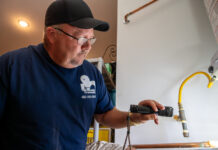
(ARA) – That vacant, foreclosed home next door isn’t just bringing down your neighborhood’s property values. It may also be a haven for a myriad of pests that can threaten the health and safety of neighbors, children and pets.
Weeds, standing water, litter and other debris along with deteriorating building conditions are characteristic of foreclosed properties. These tall grasses, overgrown shrubs and unmanaged pools offer a perfect habitat for a variety of problematic pests. In the interest of preserving public health, it is imperative that vacant structures, pools and properties be treated with pest control products to keep roaches, spiders, stinging insects, weeds and poisonous plants from moving in.
“Pests thrive in the conditions offered by a foreclosed property with nobody home,” says Allen James, president of RISE (Responsible Industry for a Sound Environment), a national organization representing the manufacturers, formulators and distributors of pesticide and fertilizer products used in and around homes and businesses.
“Rodents, roaches and mosquitoes are often thought of as merely nuisances, but they can pose serious health risks for people and pets if they are left unchecked,” James adds.
Exposure to weed and pollen allergies can trigger respiratory problems and illnesses like hay fever, especially among young children and toddlers who breathe in the airborne allergens circulating near the ground.
Pools, birdbaths and other structures that hold water around vacant homes serve as perfect breeding grounds for mosquitoes. Mosquitoes are known to transmit potentially deadly diseases like West Nile virus and encephalitis, which infect thousands of Americans each year according to the Centers for Disease Control and Prevention.
Ticks, fleas and stinging insects find refuge in overgrown weeds, natural areas and unmown lawns introducing the risks of Lyme disease, Rocky Mountain spotted fever, and infections resulting from bites and stings that cause itching, swelling and more dangerous allergic reactions in victims each year.
Poisonous and deadly spiders like the black widow and the brown recluse seek out dark, warm environments like those found under eaves, porches and inside unoccupied residences.
Roaches can thrive in empty houses and other structures like tool sheds left unused and untreated. Roaches have been proven to carry and spread E coli, streptococcus and Salmonella along with other diseases and allergens.
The threats each of these pests pose are very real and can become serious health and safety hazards if they are permitted to thrive. The challenge with foreclosed homes is finding the proper authorities to take responsibility for pest control measures that will keep neighborhoods safe and pest free.
Each homeowner has the right to choose and use the products they need to protect their own home and property, and the best defense against pests and problem weeds is the responsible use of pesticide products. For more information on pests, pesticides and proper use, please visit www.PestFacts.org.
File photo












![Alleged car thief released without charges Phoenix police stop a stolen vehicle on April 20, 2024. [Facebook]](https://www.inmaricopa.com/wp-content/uploads/2024/04/IMG_5040-218x150.jpg)

![MHS G.O.A.T. a ‘rookie sleeper’ in NFL draft Arizona Wildcats wide receiver Jacob Cowing speaks to the press after a practice Aug. 11, 2023. [Bryan Mordt]](https://www.inmaricopa.com/wp-content/uploads/2024/04/cowing-overlay-3-100x70.png)


